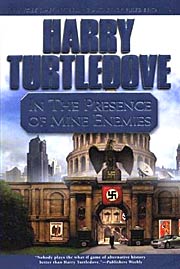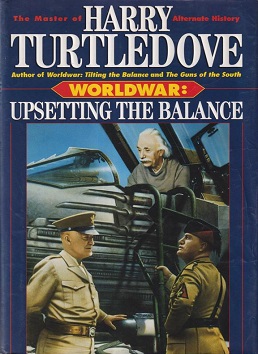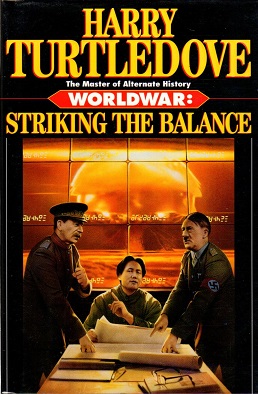
Alternate history is a subgenre of speculative fiction in which one or more historical events have occurred but are resolved differently than in actual history. As conjecture based upon historical fact, alternate history stories propose What if? scenarios about crucial events in human history, and present outcomes very different from the historical record. Some alternate histories are considered a subgenre of science fiction, or historical fiction.
The Southern Victory series or Timeline-191 is a series of eleven alternate history novels by author Harry Turtledove, beginning with How Few Remain (1997) and published over a decade. The period addressed in the series begins during the Civil War and spans nine decades, up to the mid-1940s. In the series, the Confederate States defeats the United States of America in 1862, therefore making good its attempt at secession and becoming an independent nation. Subsequent books are built on imagining events based on this alternate timeline.

Homeward Bound (2004) is a science fiction and alternate history novel by Harry Turtledove. It is the eighth and final work in his Worldwar series fictional universe. It follows the events of the Colonization trilogy and gives some closure to the storylines.
The Worldwar series is the fan name given to a series of eight alternate history science fiction novels by Harry Turtledove. Its premise is an alien invasion of Earth during World War II, and includes Turtledove's Worldwar tetralogy, as well as the Colonization trilogy, and the novel Homeward Bound. The series' time span ranges from 1942 to 2031. The early series was nominated for a Sidewise Award for Alternate History in 1996.

Colonization: Second Contact is an alternate history novel by American writer Harry Turtledove. It is the first novel of the Colonization series and the fifth installment in the Worldwar series.

In the Presence of Mine Enemies is a 2003 alternate history novel by American author Harry Turtledove, expanded from the eponymous short story. The title comes from Psalm 23:5. The novel depicts a world in which the United States remained isolationist and so did not participate in the Second World War, thus allowing a victory to the Axis powers, which divided the world among themselves. However, some years after the war, the Third World War occurred and featured the Axis powers defeating the United States and Canada.
The Axis of Time trilogy is an alternative history series of novels written by Australian journalist and author John Birmingham, from Macmillan Publishing.

Worldwar: In the Balance is a 1994 alternate history novel by American writer Harry Turtledove. It is the first novel of the Worldwar tetralogy, as well as the first installment in the extended Worldwar series that includes the Colonization trilogy and the novel Homeward Bound. The plot begins in late 1941, while the Earth is torn apart by World War II. An alien fleet arrives to conquer the planet, forcing the warring nations to make uneasy alliances against the invaders. Meanwhile, the aliens, who refer to themselves as the Race, discover that their enemy is far fiercer and more technologically advanced than expected.

Worldwar: Tilting the Balance is an alternate history novel by the American writer Harry Turtledove. It is the second book in the Worldwar tetralogy and in the extended Worldwar series, which includes the Colonization trilogy and the novel Homeward Bound.

Worldwar: Upsetting the Balance is an alternate history novel by American writer Harry Turtledove. It is the third novel of the Worldwar tetralogy and the third installment in the extended Worldwar series, which includes the Colonization trilogy and the novel Homeward Bound.

Worldwar: Striking the Balance is an alternate history novel by American writer Harry Turtledove. It is the fourth and final novel of the Worldwar tetralogy and the fourth installment in the extended Worldwar series, which includes the Colonization trilogy and the novel Homeward Bound.

Crosstime Traffic is a series of books by Harry Turtledove.

"The Road Not Taken" is a science fiction short story by American writer Harry Turtledove, in which he presents a fictitious account of a first encounter between humanity and an alien race, the Roxolani. It is a prequel to another Turtledove short story entitled "Herbig-Haro".

Colonization: Down to Earth is an alternate history and science fiction novel by Harry Turtledove. It is the second novel of the Colonization series, as well as the sixth installment in the extended Worldwar series. British editions are entitled Colonisation: Down to Earth and are the second of the Colonisation series.

Colonization: Aftershocks is an alternate history and science fiction novel by Harry Turtledove. It is the third and final novel of the Colonization series and the seventh installment in the extended Worldwar series.

The Sky People is an alternate history science fiction novel by American writer S. M. Stirling. It was first published by Tor Books in hardcover in November 2006, with a book club edition co-published with the Science Fiction Book Club following in December of the same year. Tor issued paperback, ebook, and trade paperback editions in October 2007, April 2010, and May 2010 respectively. Audiobook editions were published by Tantor Media in January 2007.

A hypothetical military victory of the Axis powers over the Allies of World War II (1939–1945) is a common topic in speculative literature. Works of alternative history (fiction) and of counterfactual history (non-fiction) include stories, novels, performances, and mixed media that often explore speculative public and private life in lands conquered by the coalition, whose principal powers were Nazi Germany, Imperial Japan, and Fascist Italy.
The War That Came Early is a six-novel series by Harry Turtledove depicting an alternate history of World War II. As is typical of Turtledove's alternate histories, the narrative follows a large cast of both fictional and historical characters.
Bibliography of science fiction, fantasy, historical fiction and nonfiction writer Harry Turtledove:














